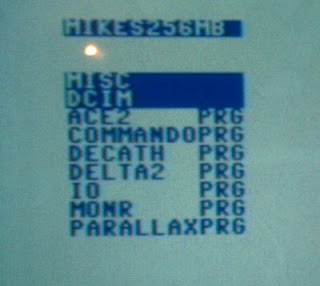I'm putting the finishing touches to the MMC64 loader and making it work with more files. I've also shrunk it down a fairly sizable amount, with the code shrinking from 1,236 bytes down to 828 bytes (sofar) and the data block has shrunk from 624 to 568. While doing this I've optimised the load a bit so that the bulk of the file gets loaded directly into the destination rather than going via a sector buffer, which should make it twice as fast - in theory.
I'm pruning down all the "nice" bits and making it a bit more hard core C64 only - something I'll reverse when I do a SCPU version in the future. So for example while file sizes can be a full 32bits, we know a stock C64 will be less then 64k, so only work in that size.
That said I've tweaked quite a bit of it so it is a little bit more robust, but it will be likely to fall over if you use it wrongly, which isn't a problem as its not designed for a file browser, but a game that KNOWS what its loading. I've also decided to ignore long filenames, because again a game doesn't care! In fact, chances are you're filenames will be something like
L1\1.PRG or
LEVEL1\DATA.PRG. But this for a game is fine.
I haven't done a directory search yet and I might not for the 1st release as that'll put the size up again, still we're now sitting at 1,396 bytes total for code and data which is pretty good indeed. So for now you'll either put the game directory in the ROOT or specify something like
GAMES\XEO3\LEVEL1\MAP.DAT. I have also yet to do PRG loading, so that it gets the 1st 2 bytes and loads it into the correct address - that will complicate things a little, but it should be okay.
I should also say I expect SAVING to come in later versions as well as its not hard to save to these things, so high score tables or editors can make use of the storage medium as well - which will also be pretty handy. Also...I do not disable interrupts, so technically speaking, you could be playing music, scrolling the screen or whatever while you load things. Also means the SCPU while taking time to load a meg of data can play music and display a loading bar or something!
So... only a little more to do for a 1st version, then I'll knock up antoher web page and post everything for whoever wants it.



